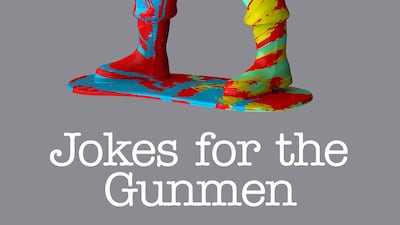Fiction can act as a mirror or a barometer, reflecting the times we live in and measuring current moods and shifting circumstances. Many a fictional tale takes a naturalistic approach to depict the sign of the times, with worked-in facts and restyled events giving rise to believable scenarios and recognisable characters.
Other fiction portrays the way we live now, not by replicating reality but by distorting it. The familiar outlines are there but so too are weird embellishments, off-the-wall antics and human oddities.
Mazen Maarouf's bravura collection of stories, Jokes for the Gunmen, fits squarely into this second camp. All 12 tales – translated seamlessly from the Arabic by Jonathan Wright – are set in graspable, credible, if not always identifiable locations. All feature individuals with whom we can connect and empathise. But all are filled with surreal episodes and outlandish flourishes – not so much for comic effect, but rather in an attempt to flag up and make sense of the tragedies and absurdities that permeate modern life.
Maarouf is a Palestinian-Icelandic writer who was born in Beirut. The best of his stories draws on his experience of growing up in a war zone, encountering danger and dealing with loss.
The book's titular tale, the longest and by far the most effective here, plays out while war rages in neighbourhood streets. Through a series of pithy, tightly focused chapters, we watch as a boy learns how to stay strong and value what matters most while under fire.
The narrator describes how his friends mocked his father after he was beaten up by gunmen on the way home from work. He earns the nickname "grasshopper", "since grasshoppers always jump and never attack". In a bid to transform his parent's reputation the boy burns himself and scratches his face, then tells his friends his father is responsible.
When this fails to have the desired effect, he resorts to desperate, dastardly measures, hatching an elaborate plan that involves selling his brother’s organs to help pay for a glass eye for his father, which will in turn frighten the gunmen and win respect from school-friends.
But then, all of sudden, Maarouf halts this farce by killing off the narrator's twin. Although the playground taunts stop, the boy's father remains a punching-bag. That is until the gunmen promise to halt the hostilities if he can make them laugh by telling them a joke a day.
And so a grieving father and son are compelled to devise gags and funny stories in order to escape violence. Unsure whether to laugh or cry, the reader follows their progress right up to the nasty sting at the end of this carefully crafted and bittersweet tale.
This isn't the only story told from a child's-eye view, or the only one to centre upon father-son relations. In the shorter, but no less rewarding, Gramophone, a man loses both his arms in a vacuum-bomb blast and then implores his son to donate him one of his. And in Cinema, dozens of families take refuge in the eponymous place, only to be wiped out when a shell hits the auditorium – leaving the sole survivor, a young boy, to fend for himself with a teddy bear full of cheese for sustenance and a cow for company.
Elsewhere, we meet a man who can't smile yet is able to kill people with a punchline; an amateur matador who dies three times; a trigger-happy relative; and an invasive dreamer. Maarouf shows that there is method in his madness, using whimsical conceits to illustrate the chaos and futility unleashed by war.
Amid the mayhem are moments of tenderness and pathos. A boy cherishes his pepper plant, believing that each tiny pepper represents a family member's soul. And a mother insists on baking in her kitchen during bombing raids, only joining her family in the shelter when her cakes are ready.
One or two stories are too fanciful for their own good. Also, despite clear stylistic inventiveness, there are no real formal risks on display. Every tale is narrated by an unnamed male figure and each new adult voice – including that of a bull – is indistinguishable from the last.
However, these are minor faults, for Maarouf gives us much to admire and more to enjoy. His bold and masterful stories laugh in the face of adversity and shine vital rays of light through darkness and despair.

